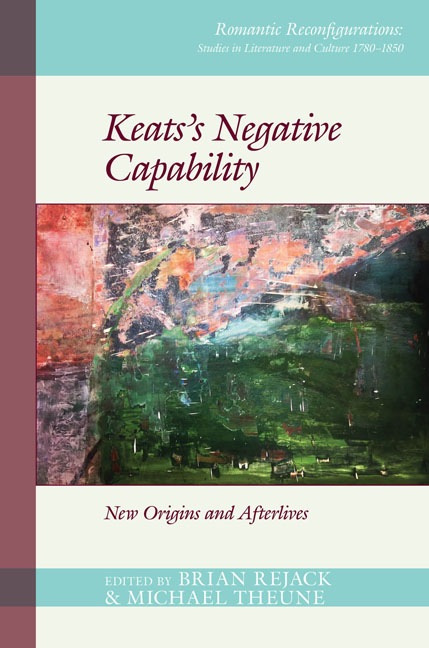Book contents
- Frontmatter
- Contents
- List of Figures
- Acknowledgments
- List of Abbreviations
- List of Contributors
- Preface
- Introduction: Disquisitions: Reading Negative Capability, 1817–2017
- Part I ‘swelling into reality’: New Contexts for Negative Capability
- Part II ‘examplified throughout’: Forms of Negatively Capable Reading
- Part III ‘pursued through Volumes’, Volume I: Negative Capability in Twentieth- and Twenty-First-Century American Poetry
- Part IV ‘pursued through Volumes’, Volume II: Adaptations, Appropriations, Mutations
- Afterword: Reading Keats's Negative Capability
- Bibliography
- Index
6 - Knowledge's ‘gordian shape’: Keats and the Disciplines
- Frontmatter
- Contents
- List of Figures
- Acknowledgments
- List of Abbreviations
- List of Contributors
- Preface
- Introduction: Disquisitions: Reading Negative Capability, 1817–2017
- Part I ‘swelling into reality’: New Contexts for Negative Capability
- Part II ‘examplified throughout’: Forms of Negatively Capable Reading
- Part III ‘pursued through Volumes’, Volume I: Negative Capability in Twentieth- and Twenty-First-Century American Poetry
- Part IV ‘pursued through Volumes’, Volume II: Adaptations, Appropriations, Mutations
- Afterword: Reading Keats's Negative Capability
- Bibliography
- Index
Summary
Disciplinarity was unkind to John Keats, and the review was its bludgeon. The literary field, elite reviewers, and other poets famously responded to the incursions of an ‘uneducated and flimsy stripling’ into their midst by attacking his medical training and education. His previous professional commitments, unrefined by medical celebrity and ungilded by a reputation for scientific genius, encouraged critics rhetorically to undermine his poetic legitimacy. Attacking Keats's education, John Gibson Lockhart (under the pseudonym ‘Z’) wrote disparagingly that both Keats and Leigh Hunt ‘write about Apollo, Pan, Nymphs, Muses, and Mysteries, as might be expected from persons of their education’ (Z, p. 275). Nicholas Roe argues that these reviews waged a proxy war in the literary press against the politically threatening models of dissenting education embodied in Keats's Enfield School: ‘it was Keats's unusual educational background, above all, which served as a focus for [Lockhart’s] animosity’. Lockhart dismissed Keats to the apothecary's toiling anonymity: ‘It is a better and a wiser thing to be a starved apothecary than a starved poet; so back to the shop Mr John, back to ‘plasters, pills, and ointment boxes’, &c’. (Z, p. 276). This is a disciplinary dismissal; even if Lockhart subtextually disregards Keats on the basis of the young poet's radical politics, he explicitly claims that Keats's problem is that he lacks the right sort of expertise.
Keats responded by redoubling his commitment to maintaining porous boundaries between medical and poetic practice. Critics have spoken voluminously about how Keats's medical training emerges in his poetry. His characterization of the poet as ‘A humanist, physician to all men’ in The Fall of Hyperion fuses his two professional pursuits (Canto I: line 190). Indeed, as Roe maintains, Keats's responses to the critical drubbing of Endymion indicate that he considered his apothecary training and his poetry as intertwined (pp. 168–9). For instance, in an 1819 letter to his brother, Keats wrote, ‘I have been at different times turning it in my head whether I should go to Edinburgh & study for a physician’, going on to suggest that should he fail in that role it would not be because of an incapacity for the work but because of a distaste for the need to charge fees as a healer (LJK, II: p. 70).
Information
- Type
- Chapter
- Information
- Keats's Negative CapabilityNew Origins and Afterlives, pp. 93 - 107Publisher: Liverpool University PressPrint publication year: 2019
